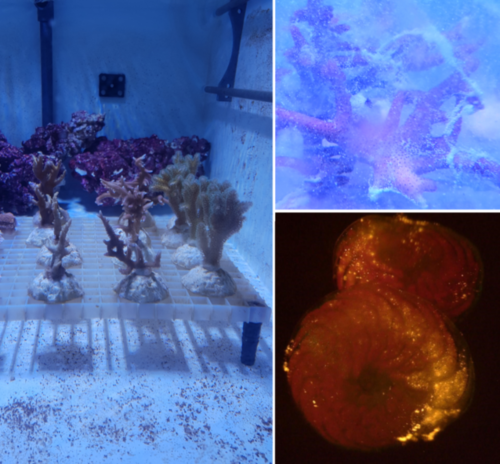Fallstudie B2
Case Study B2: Environmental Impact of Advanced Materials on Marine Fauna and Flora
Advanced materials created by combining polymeric and inorganic components (as in the examples of nanoparticle-loaded high-performance fibres or hybrid clusters) can enter the environment and degrade there. The effects of the resulting degradation products on the environment and living organisms are not taken into account in current concepts. As more and more advanced materials are developed, it is important to accompany the engineering process with the study of environmental impacts. In case study B2, the effects of advanced materials are compared with those of “conventional” particles such as microplastics and naturally occurring inorganic particles. The aim is to assess the environmental impact of advanced materials.
Impact of advanced materials on terrestrial and aquatic plants at IPB
Different effects of the degradation products of advanced materials are possible. They can serve as vectors for pathogens, release toxins, mechanically damage tissue and/or lead to higher energy requirements of the organisms. At IPB, the immediate reaction of soil plants to the materials developed in case studies A1 and B1 will be investigated at the molecular level, with a focus on secondary metabolomics.
Impact of advanced materials on marine carbonate-secreting organisms at ZMT
Corals and large foraminifera as well as their symbionts (algae) are used as model organisms for the investigation of the materials developed in case studies A1 and B1. The aquaria of the ZMT are being made available for this purpose. Particle uptake and excretion, as well as their penetration or incorporation into the organisms and their impact on metabolism and skeletal growth will be investigated.

References and previous work
- Hierl F, Wu HC, Westphal H (2021) Scleractinian corals incorporate microplastic particles: Identification from a laboratory study. Environmental Science and Pollution Research 28 (2021) 37882. https://doi.org/10.1007/s11356-021-13240-x
- Humphreys AF, Halfar J, Ingle JC, Manzello D, Reymond CE, Westphal H, Riegl B, Shallow-water Benthic Foraminifera of the Galápagos Archipelago: Ecologically Sensitive Carbonate Producers in an Atypical Tropical Oceanographic Setting. Journal Foraminiferal Research 49 (2019) 29. https://doi.org/10.2113/gsjfr.49.1.29
- Halfar J, Humphreys AF, Ingle JC, Manzello D, Reymond CE, Westphal H, Riegl B, Effect of seawater temperature, pH, and nutrients on the character, distribution, and low abundance of shallow water benthic foraminifera in the Galápagos. PLOS One 13:9 (2018) e0202746. https://doi.org/10.1371/journal.pone.0202746
- Farag M, Meyer A, Ali A, Salem M, Giavalisco P, Westphal H, Wessjohann L (2018) A comparative metabolomics approach detects stress-specific responses during coral bleaching in soft corals. Journal of Proteome Research 17 (2018) 2060. https://doi.org/10.1021/acs.jproteome.7b00929
- Herrán N, Narayan GR, Reymond CE, Westphal H, Calcium carbonate production, coral cover and diversity along a distance gradient from Stone Town: a case study from Zanzibar, Tanzania. Frontiers in Marine Science 4 (2017) 412. https://doi.org/10.3389/fmars.2017.00412IPB
- Farag MA, Westphal H, Eissa TF, Wessjohann LA, Meyer A, Effect of oxylipins, terpenoid precursors and wounding on soft corals‘ secondary metabolism as analyzed via UHPLC/MS and chemometrics. Molecules 22 (2017) 2195. https://doi.org/10.3390/molecules22122195
- Farag MA, Al-Mahdy DA, Meyer A, Westphal H, Wessjohann LA, Metabolomics reveals biotic and abiotic elicitor effects on the soft coral Sarcophyton ehrenbergi terpenoid content. Scientific Reports (Nature) 2017, 7 (2017) 648. https://doi.org/10.1038/s41598-017-00527-8
- Farag MA, Maamoun AA, Meyer A, Wessjohann LA, Salicylic acid and its derivatives elicit the production of diterpenes and sterols in corals and their algal symbionts: a metabolomics approach to elicitor SAR. Metabolomics 2018, 14 (2018) 127. https://doi.org/10.1007/s11306-018-1416-y
- Farag MA, Porzel A, Al-Hammady MA, Hegazy M-EF, Meyer A, Mohamed TA, Westphal H, Wessjohann LA, Soft Corals Biodiversity in the Egyptian Red Sea: A Comparative MS and NMR Metabolomics Approach of Wild and Aquarium Grown Species. Journal of Proteome Research 15 (2016) 1274. https://doi.org/10.1021/acs.jproteome.6b00002
- Farag MA, Mostafa I. Fekry MI, Al-Hammady MA, Khalil MN, El-Seedi HR, Meyer A, Porzel A, Westphal H, Wessjohann LA, Cytotoxic Effects of Sarcophyton sp. Soft Corals – Is There a Correlation to Their NMR Fingerprints? Marine Drugs 15:7 (2017) 211. https://doi.org/10.3390/md15070211
Involved Partners




